
Gusty winds and low relative humidity will bring critical fire weather to the central/southern High Plains and portions of the Midwest. Two Pacific storms will continue to bring heavy mountain snow and gusty winds to the western U.S. through Thursday. A swath of wintry weather, including heavy snow and a wintry mix, is expected from the Northern Plains to New England. Read More >
Overview
|
Two strong winter storms moved through the Dakotas during late March and early April 2023, bringing with them heavy snow, icing in eastern SD and western MN, along with gusty winds. They were both tied to a "Colorado Low", which is a low pressure system that develops east of the Rockies in Colorado and then moves through the Plains and into the Upper Mississippi Valley. While the process that created the storms was similar, there were differences in how each storm evolved. The March 31st storm had the heavy snow falling over central and northeast SD (amounts over a foot in a corridor between Pierre and Ipswich) while there were winds gusting to 40 to 55 mph. This produced blizzard conditions over much of central and northeast SD during the day and evening on March 31st. In addition, ice accumulations of over a quarter of an inch were reported in Grant, Codington, and Deuel counties. The April 4-5th event on the other hand had the heavy snow falling on April 4th over central and northeast SD, with northeast winds of 15-30mph. The combination of the snow and the winds led to visibilities being frequently reduced below a mile and at times down to a quarter mile in central and northeast SD. Meanwhile, the initial snow over east central SD transitioned to freezing rain for a period of time during the late afternoon and evening hours before switching back to snow. As the snow came to an end on April 5th, the winds shifted around to the west-northeast and with gusts of 30-45 mph, led to blowing and drifting of the new snow. These two storms capped off an already snowy winter season. Such late-season abnormal cold and snow also set the stage for significant spring flooding for parts of northeastern South Dakota and west central Minnesota. |
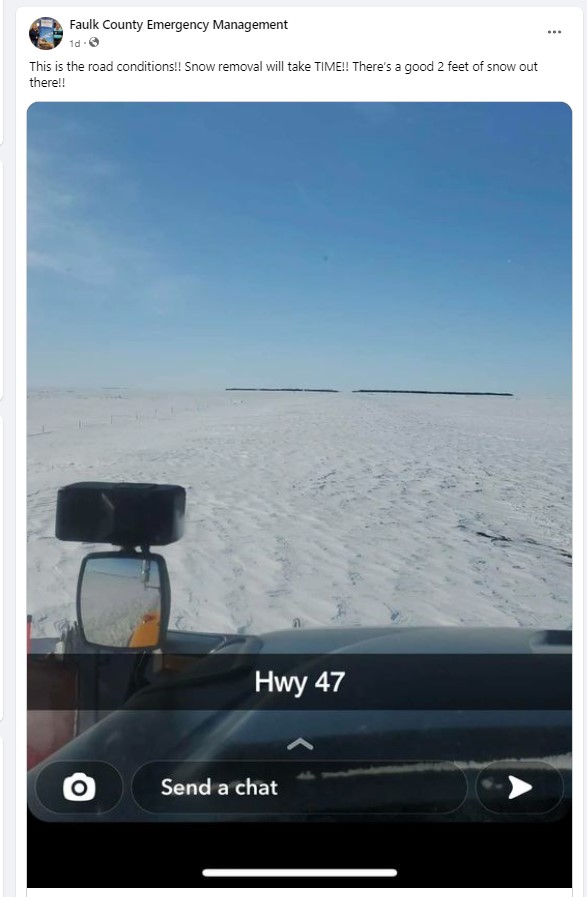 View of Highway 47 in Faulk County after the March 31 event (Image from Faulk County EM) |
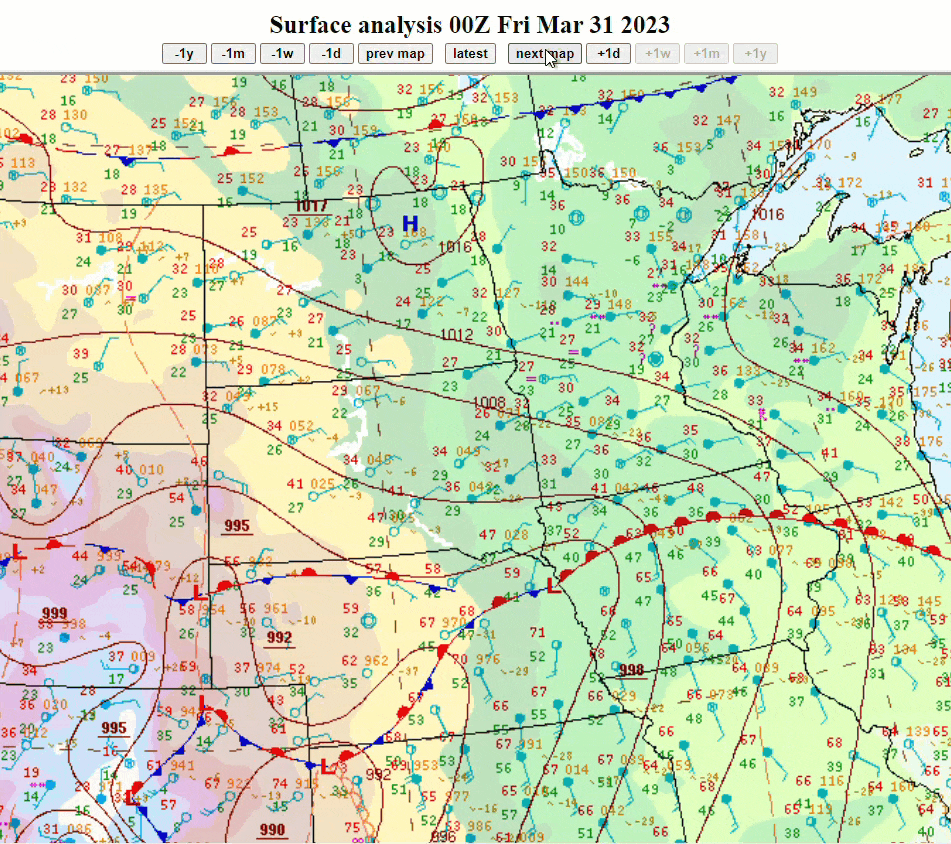 |
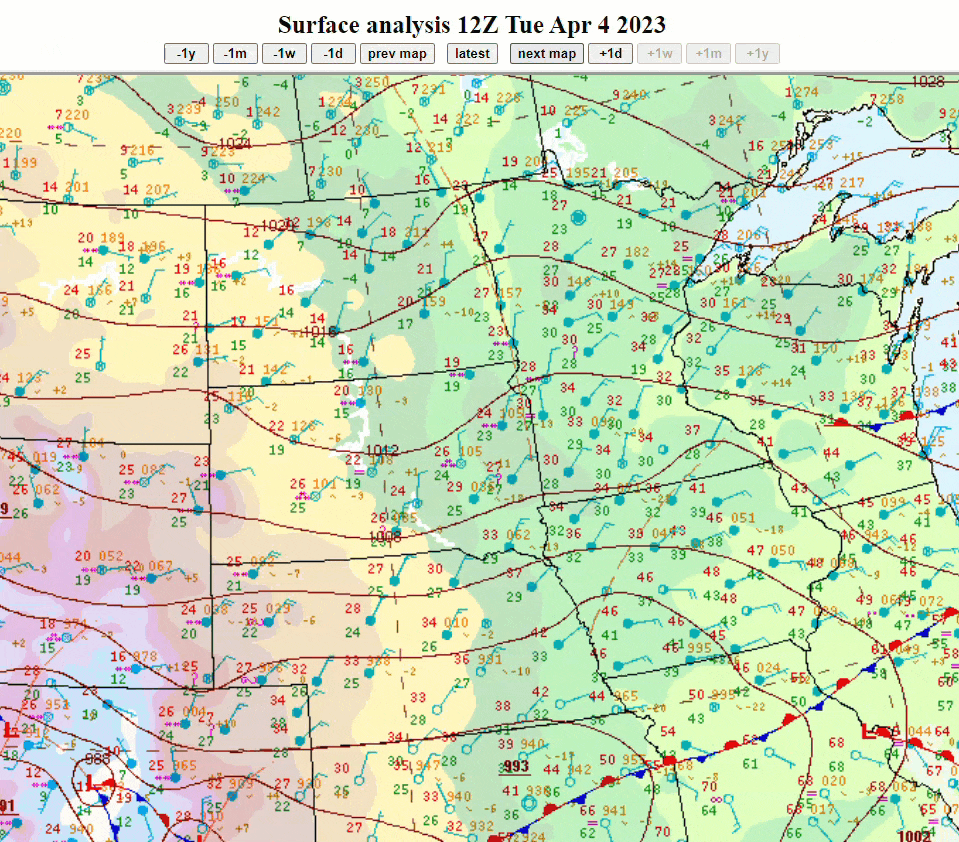 |
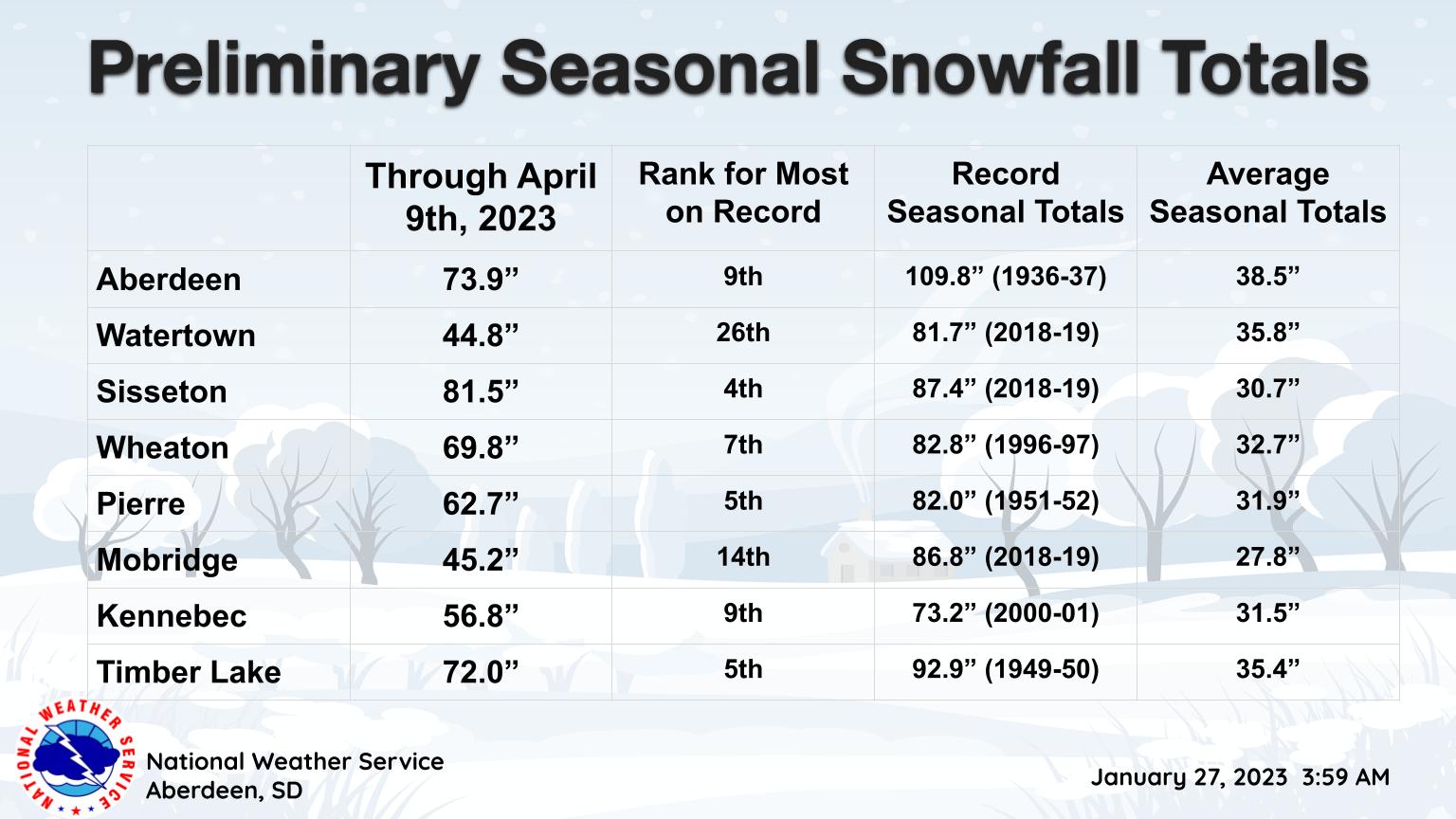 |
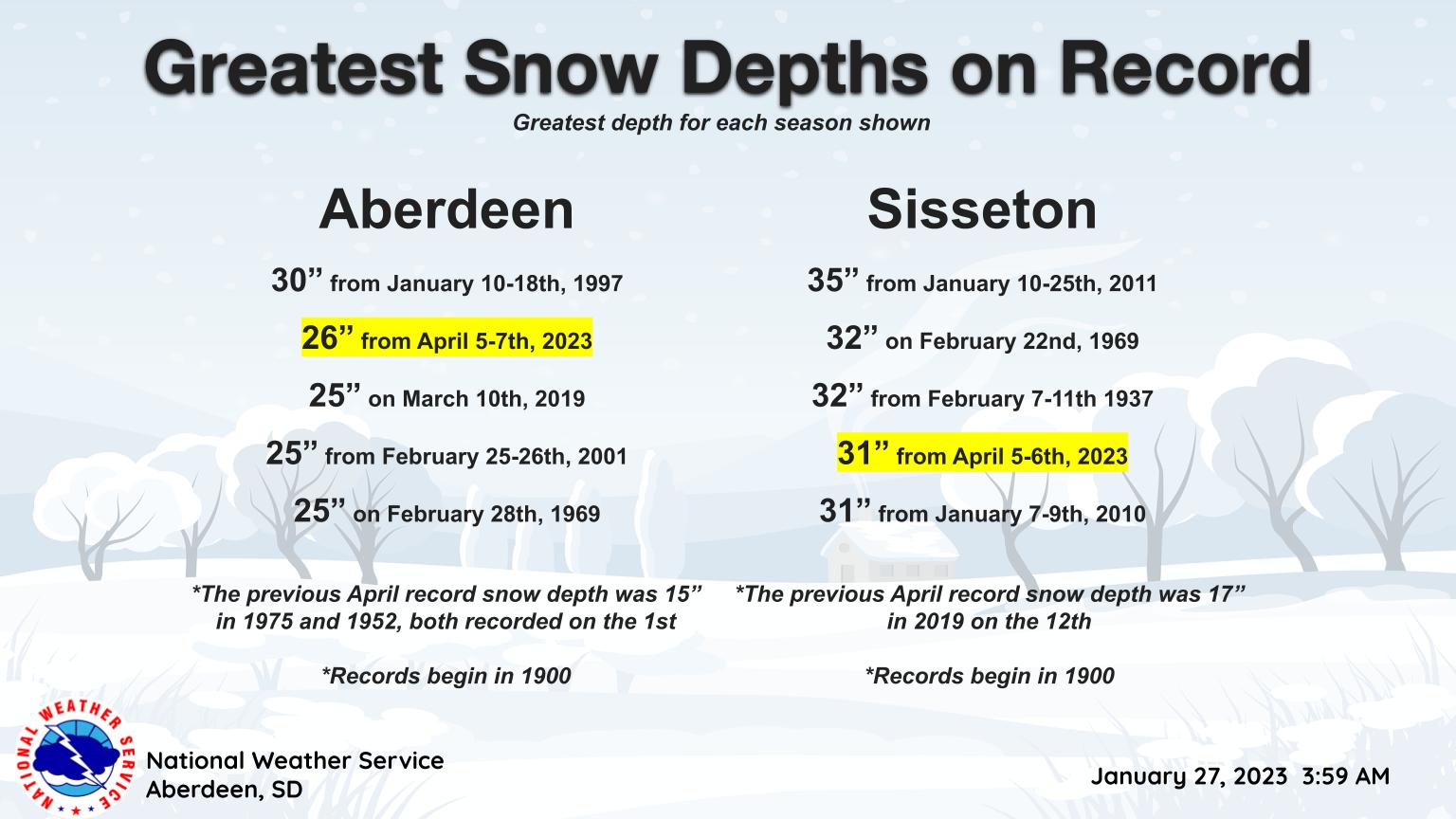 |
| Surface weather map for the March 31, 2023 Event | Surface weather map for the April 4-5, 2023 Event | Seasonal snowfall totals as of April 9th, 2023 | Snow depths across places such as Aberdeen and Sisseton were unprecedented for April. |
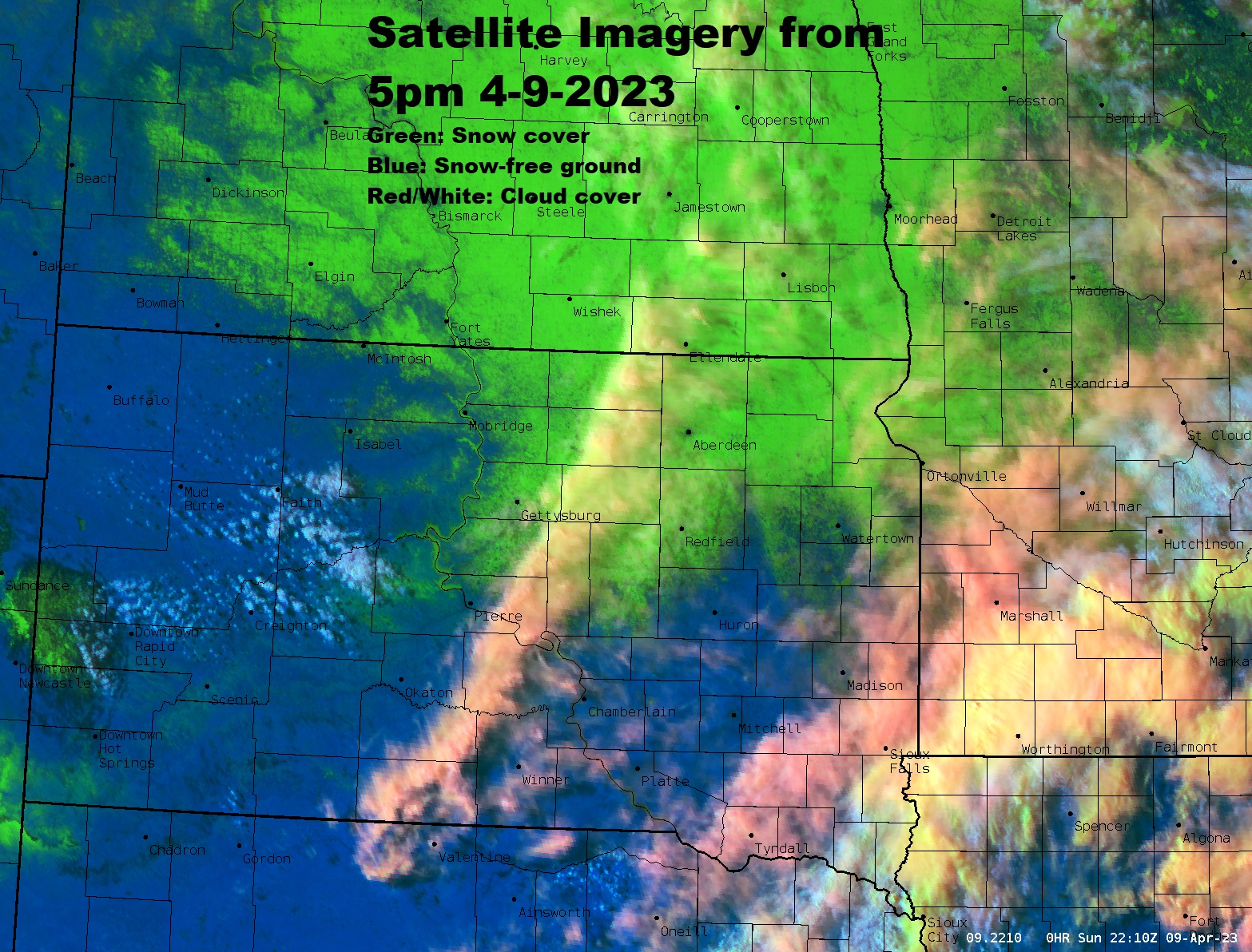 |
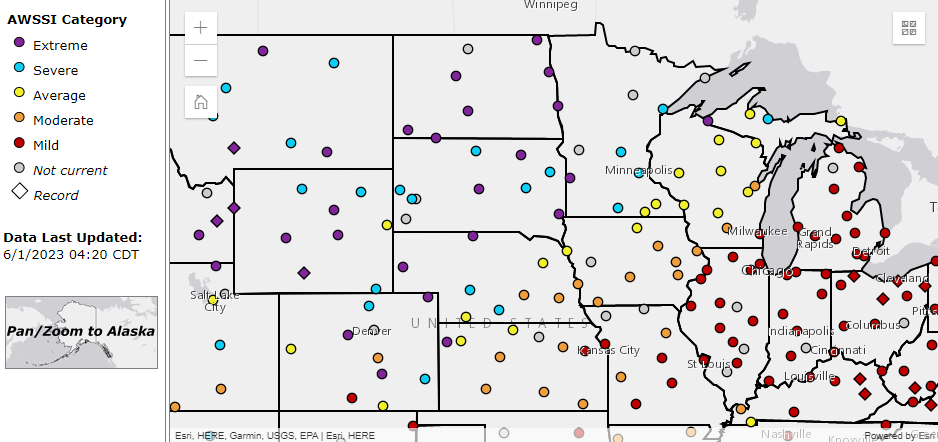 |
||
| Satellite imagery on April 9th shows plenty of snow yet in place, as a quick melt continued. | The 2022-2023 winter season finished Severe to Extreme according to the Accumulated Winter Season Severity Index. |
March 31 Snow/Ice/Blizzard
Event Snowfall - March 31st, 2023
Peak Wind Gusts on March 31st (in mph)
List of snowfall, ice, and Blizzard reports
PRELIMINARY LOCAL STORM REPORT...SUMMARY
NATIONAL WEATHER SERVICE ABERDEEN SD
1148 PM CDT SAT APR 1 2023
..TIME... ...EVENT... ...CITY LOCATION... ...LAT.LON...
..DATE... ....MAG.... ..COUNTY LOCATION..ST.. ...SOURCE....
..REMARKS..
0700 AM SNOW 5 NNW MIRANDA 45.03N 99.00W
04/01/2023 M18.0 INCH FAULK SD COCORAHS
0157 PM HEAVY SNOW 7 E HAYES 44.37N 100.89W
04/01/2023 M16.0 INCH STANLEY SD TRAINED SPOTTER
STORM TOTAL.
0700 AM HEAVY SNOW 8 SSW HIGHMORE 44.41N 99.50W
04/01/2023 M15.0 INCH HYDE SD COCORAHS
0700 AM HEAVY SNOW 17 N HOLABIRD 44.77N 99.59W
04/01/2023 M15.0 INCH HYDE SD COCORAHS
1100 PM HEAVY SNOW HIGHMORE 44.52N 99.44W
03/31/2023 M14.2 INCH HYDE SD PUBLIC
RELAYED THROUGH TWITTER. END TIME ESTIMATED.
1100 PM HEAVY SNOW WILMOT 45.41N 96.86W
03/31/2023 E14.0 INCH ROBERTS SD PUBLIC
1150 PM HEAVY SNOW 1 NW PIERRE 44.37N 100.35W
03/31/2023 M14.0 INCH HUGHES SD PUBLIC
0509 AM HEAVY SNOW CRESBARD 45.17N 98.95W
04/01/2023 E14.0 INCH FAULK SD PUBLIC
SNOW ACCUMULATION ESTIMATED BETWEEN 12 AND
16 INCHES.
1138 AM HEAVY SNOW FAULKTON 45.04N 99.13W
04/01/2023 M14.0 INCH FAULK SD CO-OP OBSERVER
0900 PM HEAVY SNOW ONIDA 44.70N 100.07W
03/31/2023 M13.0 INCH SULLY SD PUBLIC
1100 PM HEAVY SNOW 4 SE ANDOVER 45.37N 97.84W
03/31/2023 M12.5 INCH DAY SD PUBLIC
0900 PM HEAVY SNOW GROTON 45.45N 98.10W
03/31/2023 E12.0 INCH BROWN SD PUBLIC
1100 PM HEAVY SNOW TOLSTOY 45.21N 99.61W
03/31/2023 E12.0 INCH POTTER SD PUBLIC
RELAYED THROUGH TWITTER.
0257 PM HEAVY SNOW 1 S CHELSEA 45.16N 98.74W
04/01/2023 M12.0 INCH FAULK SD TRAINED SPOTTER
0845 PM HEAVY SNOW 3 ESE CLAIRE CITY 45.84N 97.05W
03/31/2023 M11.5 INCH ROBERTS SD PUBLIC
1102 PM HEAVY SNOW 2 ENE HILLHEAD 45.84N 97.35W
03/31/2023 M11.2 INCH MARSHALL SD PUBLIC
1100 PM HEAVY SNOW PIERRE 44.37N 100.35W
03/31/2023 E11.0 INCH HUGHES SD PUBLIC
0300 AM HEAVY SNOW REDFIELD 44.87N 98.52W
04/01/2023 E11.0 INCH SPINK SD PUBLIC
0700 AM HEAVY SNOW 3 W GRENVILLE 45.47N 97.44W
04/01/2023 M11.0 INCH DAY SD COCORAHS
1138 PM SNOW 11 ENE SISSETON MUNICIP 45.70N 96.77W
03/31/2023 M10.5 INCH ROBERTS SD PUBLIC
0930 PM HEAVY SNOW 1 NNW ABERDEEN 45.48N 98.49W
03/31/2023 M10.0 INCH BROWN SD PUBLIC
0100 AM HEAVY SNOW MANSFIELD 45.24N 98.56W
04/01/2023 E10.0 INCH SPINK SD PUBLIC
DRIFTS TO 4 FEET.
0600 AM HEAVY SNOW 4 W CHELSEA 45.17N 98.82W
04/01/2023 M10.0 INCH FAULK SD COCORAHS
0849 AM HEAVY SNOW 1 NE PIERRE REGIONAL AI 44.39N 100.29W
04/01/2023 M10.0 INCH HUGHES SD CO-OP OBSERVER
0300 PM HEAVY SNOW 3 W OKATON 43.89N 100.95W
03/31/2023 M9.0 INCH JONES SD COCORAHS
MEASURED BEFORE WINDS PICKED UP.
0719 AM HEAVY SNOW 1 NNE BROWNS VALLEY 45.60N 96.83W
04/01/2023 M9.0 INCH TRAVERSE MN CO-OP OBSERVER
1232 PM HEAVY SNOW ANDOVER 45.42N 97.90W
04/01/2023 M9.0 INCH DAY SD CO-OP OBSERVER
1000 PM SNOW SISSETON MUNICIPAL AIRP 45.67N 97.00W
03/31/2023 M8.6 INCH ROBERTS SD CO-OP OBSERVER
CO-OP OBSERVER STATION SSSS2 SISSETON 2 E.
0828 AM HEAVY SNOW ROSCOE 45.45N 99.34W
04/01/2023 M7.7 INCH EDMUNDS SD CO-OP OBSERVER
1102 AM SNOW ORTONVILLE 45.30N 96.44W
04/01/2023 M7.5 INCH BIG STONE MN PUBLIC
0808 AM HEAVY SNOW 3 NNW WESTPORT 45.69N 98.53W
04/01/2023 M7.5 INCH BROWN SD CO-OP OBSERVER
0918 AM HEAVY SNOW ABERDEEN REGIONAL AIRPO 45.46N 98.41W
04/01/2023 E7.5 INCH BROWN SD OFFICIAL NWS OBS
1049 AM HEAVY SNOW MURDO 43.89N 100.71W
04/01/2023 M7.3 INCH JONES SD CO-OP OBSERVER
1000 PM HEAVY SNOW VICTOR 45.87N 96.84W
03/31/2023 M7.0 INCH ROBERTS SD PUBLIC
1021 AM HEAVY SNOW 1 NE MILBANK 45.23N 96.62W
04/01/2023 M7.0 INCH GRANT SD CO-OP OBSERVER
0727 AM HEAVY SNOW BRITTON 45.80N 97.75W
04/01/2023 M6.8 INCH MARSHALL SD CO-OP OBSERVER
1048 AM HEAVY SNOW ROY LAKE STATE PARK 45.71N 97.44W
04/01/2023 M6.5 INCH MARSHALL SD CO-OP OBSERVER
0900 PM HEAVY SNOW BROWNS VALLEY 45.59N 96.83W
03/31/2023 M6.0 INCH TRAVERSE MN PUBLIC
0700 AM HEAVY SNOW 9 N VIVIAN 44.05N 100.26W
04/01/2023 M6.0 INCH LYMAN SD COCORAHS
0700 AM SNOW TURTON 45.05N 98.10W
04/01/2023 M5.5 INCH SPINK SD COCORAHS
0700 AM SNOW 7 S VAYLAND 44.39N 98.80W
04/01/2023 M5.3 INCH HAND SD COCORAHS
0700 AM SNOW LA BOLT 45.05N 96.67W
04/01/2023 M5.2 INCH GRANT SD COCORAHS
0700 AM SNOW 2 SSE CLAREMONT 45.64N 98.00W
04/01/2023 M5.2 INCH BROWN SD COCORAHS
0700 AM SNOW 6 NE ROSCOE 45.51N 99.25W
04/01/2023 M5.0 INCH EDMUNDS SD COCORAHS
0900 AM SNOW 2 NNW EAGLE BUTTE 45.03N 101.26W
04/01/2023 M5.0 INCH DEWEY SD COCORAHS
0924 AM SNOW WEBSTER 45.34N 97.52W
04/01/2023 M5.0 INCH DAY SD CO-OP OBSERVER
1023 AM SNOW CLARK 44.88N 97.73W
04/01/2023 M3.1 INCH CLARK SD CO-OP OBSERVER
1208 PM SNOW ONIDA 44.70N 100.07W
03/31/2023 E3.0 INCH SULLY SD PUBLIC
STILL SNOWING. LOW VISIBILITY AS WELL.
0700 AM SNOW 4 NNE RELIANCE 43.93N 99.57W
04/01/2023 M3.0 INCH LYMAN SD COCORAHS
0700 AM SNOW 4 WNW LAKE COCHRANE REC 44.73N 96.54W
04/01/2023 M2.6 INCH DEUEL SD PUBLIC
1139 AM SNOW 3 NNE GANN VALLEY 44.08N 98.97W
04/01/2023 M2.6 INCH BUFFALO SD CO-OP OBSERVER
0900 AM SNOW MURDO 43.88N 100.72W
03/31/2023 M2.4 INCH JONES SD CO-OP OBSERVER
CO-OP OBSERVER STATION MURS2 MURDO. STILL
SNOWING.
0500 PM ICE STORM 4 S STRANDBURG 44.99N 96.76W
03/31/2023 GRANT SD PUBLIC
PHOTOS OF 1/3 INCH OF ICE VIA FACEBOOK. TIME
ESTIMATED.
1000 PM ICE STORM 3 S BRANDT 44.62N 96.63W
03/31/2023 DEUEL SD EMERGENCY MNGR
CORRECTS TO ADD ADDITIONAL NOTES. 1/2 TO 3/4
INCH ICE ACCUMULATION. RAIN TURNED TO SNOW
AROUND 10:30 PM FRIDAY NIGHT.
0637 AM ICE STORM WATERTOWN 44.90N 97.10W
04/01/2023 CODINGTON SD CO-OP OBSERVER
1/4 INCH OF ICE UNDER THE SNOW.
0230 PM BLIZZARD 2 N HOVEN 45.27N 99.78W
03/31/2023 WALWORTH SD PUBLIC
LESS THAN ONE QUARTER MILE VISIBILITY AND
HEAVY SNOW. REPORTER COULD NOT SEE MORE THAN
A FEW YARDS.
0854 PM BLIZZARD ORTONVILLE 45.30N 96.44W
03/31/2023 BIG STONE MN PUBLIC
0855 PM BLIZZARD FLORENCE 45.06N 97.33W
03/31/2023 CODINGTON SD PUBLIC
VIDEO VIA FACEBOOK.
0900 PM BLIZZARD EUREKA 45.77N 99.62W
03/31/2023 MCPHERSON SD COCORAHS
COCORAHS COMMENTED ON GROUND BLIZZARD
CONDITIONS DESPITE LACK OF SNOWFALL. ROADS
BLOCKED IN OPEN AREAS.
0900 PM BLIZZARD HIGHMORE 44.52N 99.44W
03/31/2023 HYDE SD PUBLIC
RELAYED PHOTOS THROUGH FACEBOOK.
1000 PM BLIZZARD LAKE CITY 45.72N 97.41W
03/31/2023 MARSHALL SD PUBLIC
RELAYED VIDEO THROUGH FACEBOOK. TIME
ESTIMATED.
1000 PM BLIZZARD ABERDEEN REGIONAL AIRPO 45.46N 98.41W
03/31/2023 BROWN SD OFFICIAL NWS OBS
1/4 MILE OR LESS VISIBILITY FOR MORE THAN
THREE HOURS FRIDAY AFTERNOON (KABR ASOS).
STORM TOTAL SNOW WAS 7.5 INCHES.
1027 PM BLIZZARD REDFIELD 44.87N 98.52W
03/31/2023 SPINK SD PUBLIC
MESSAGE BLIZZARD CONDITIONS ON FACEBOOK.
1037 PM BLIZZARD MILLER 44.52N 98.99W
03/31/2023 HAND SD PUBLIC
VIDEO RELAYED THROUGH FACEBOOK.
0716 AM BLIZZARD 3 W SISSETON 45.66N 97.11W
04/01/2023 ROBERTS SD CO-OP OBSERVER
8.6 INCHES.
&&
March 31 Photos
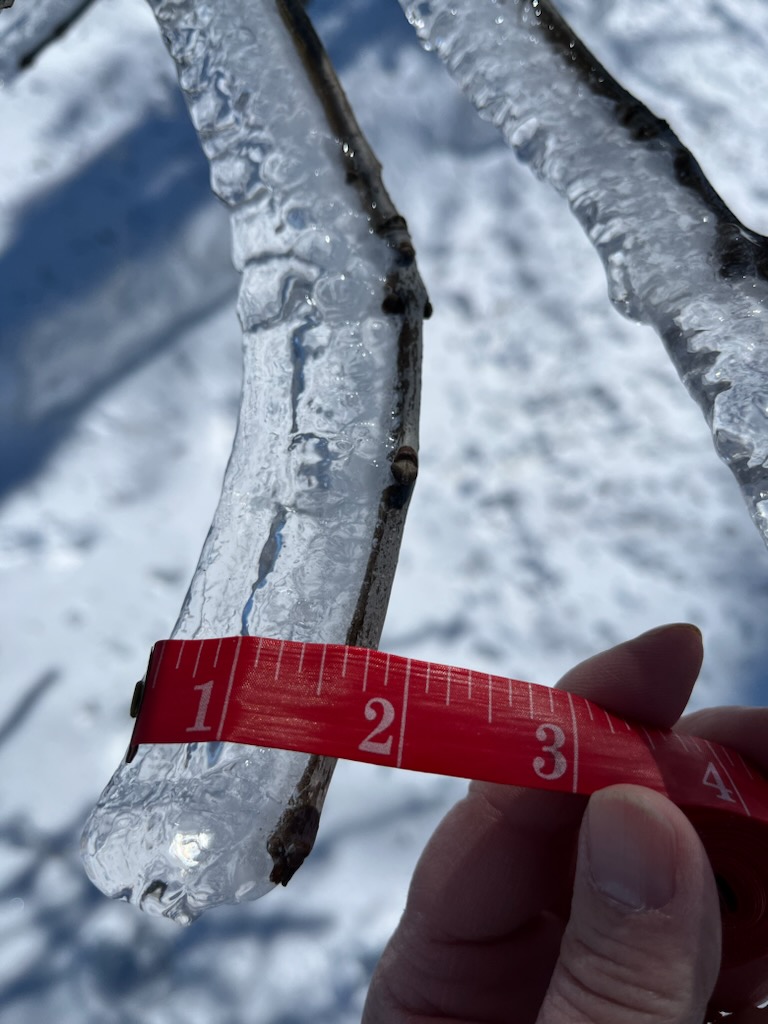 |
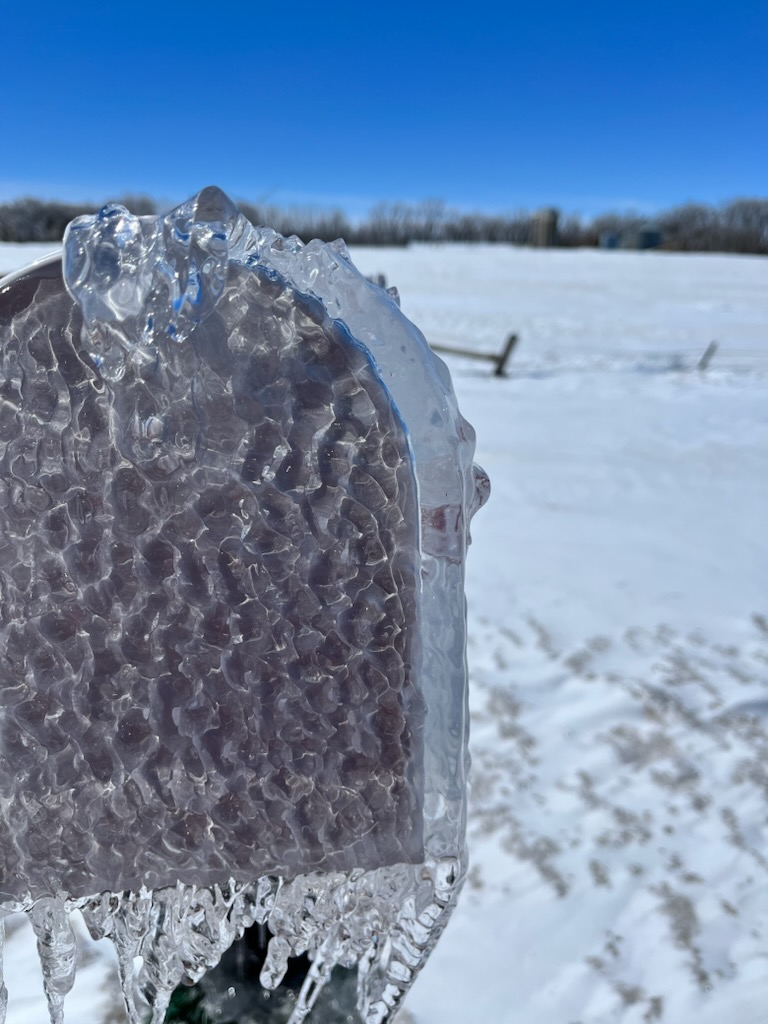 |
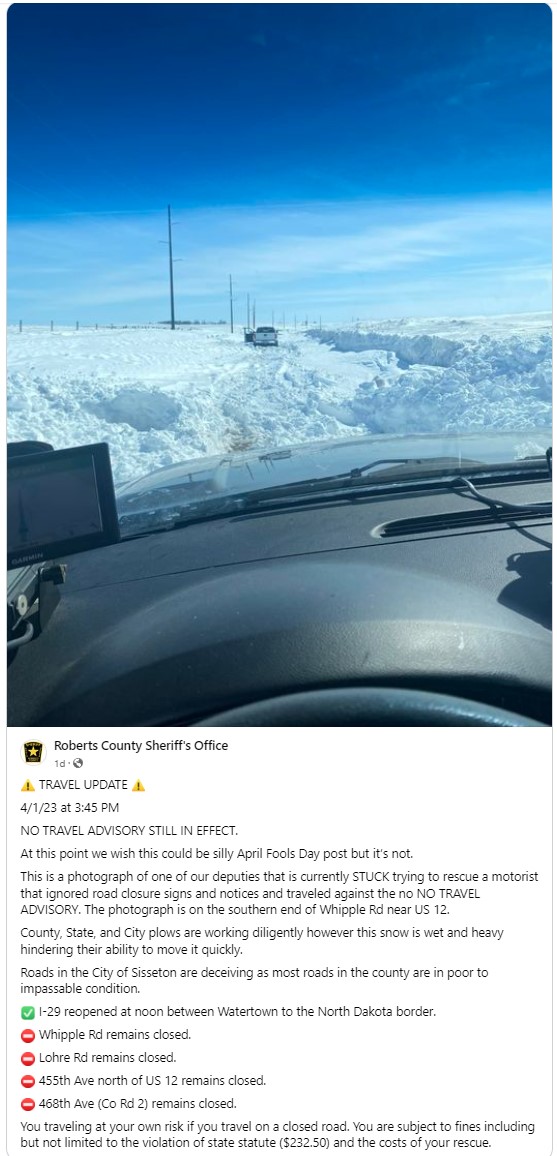 |
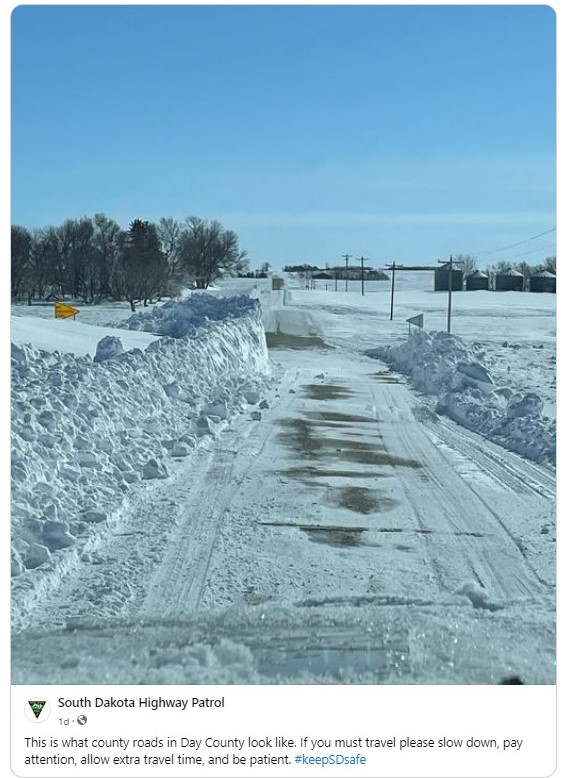 |
| Ice accumulation on a tree branch near Brandt, SD (Deuel County EM) | Ice accumulation on a mailbox near Brandt, SD (Deuel County EM) | Travel conditions the day after the March 31 event in Roberts County (Roberts County Sheriff's Office) | Travel conditions the day after the March 31 event in Day County (SD Highway Patrol) |
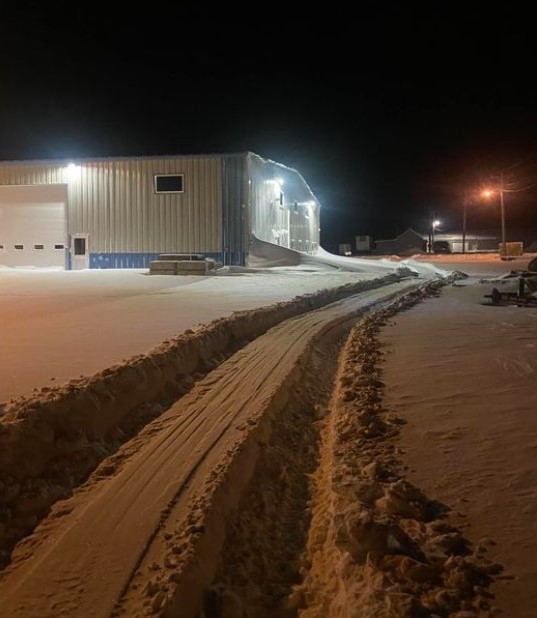 |
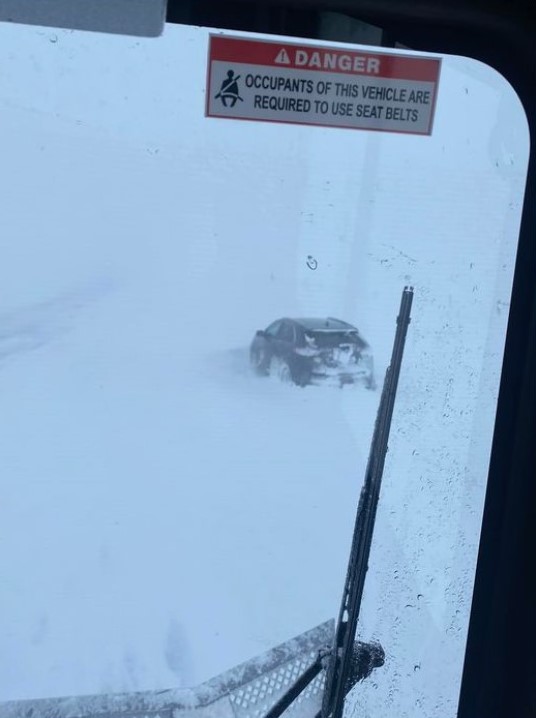 |
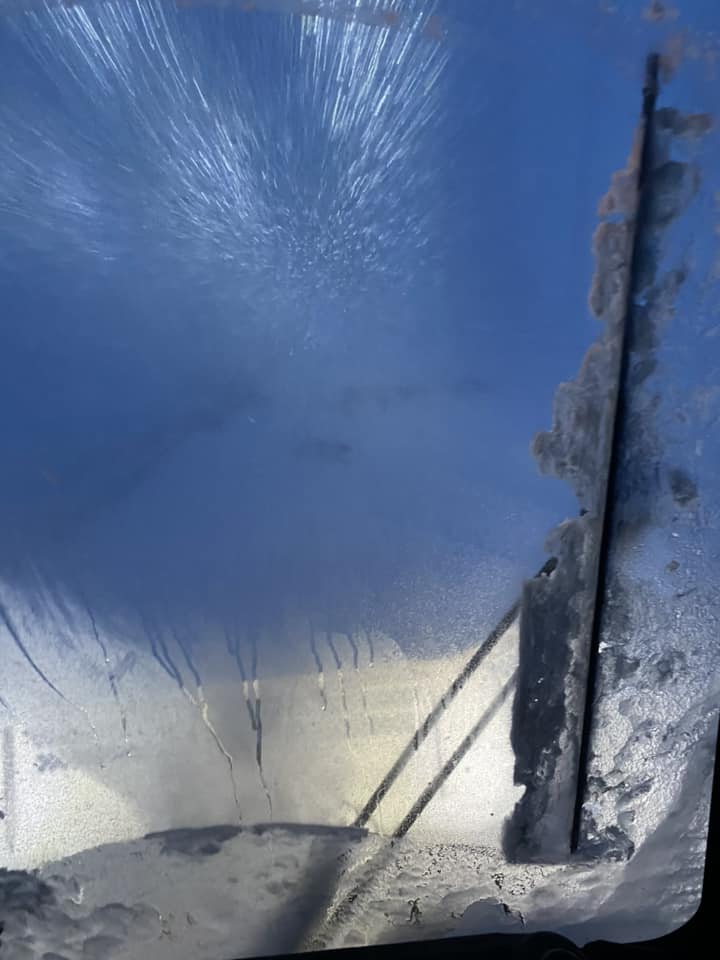 |
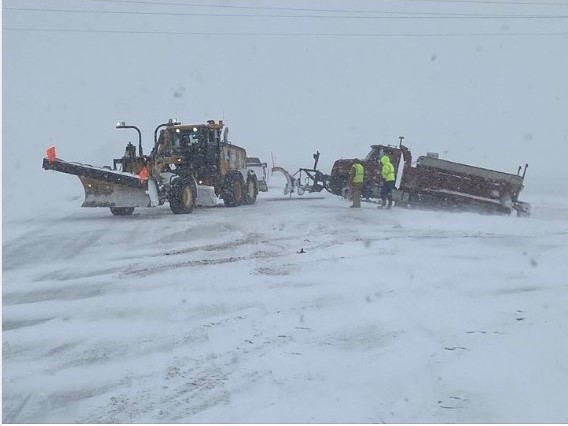 |
| Saturday morning in Faulkton (Faulk County EM) | Photo courtesy of the Hand County Sheriff's Office | Photo courtesy of the Hand County Sheriff's Office | Long day for county snow crews (Hughes County Sheriff's Office) |
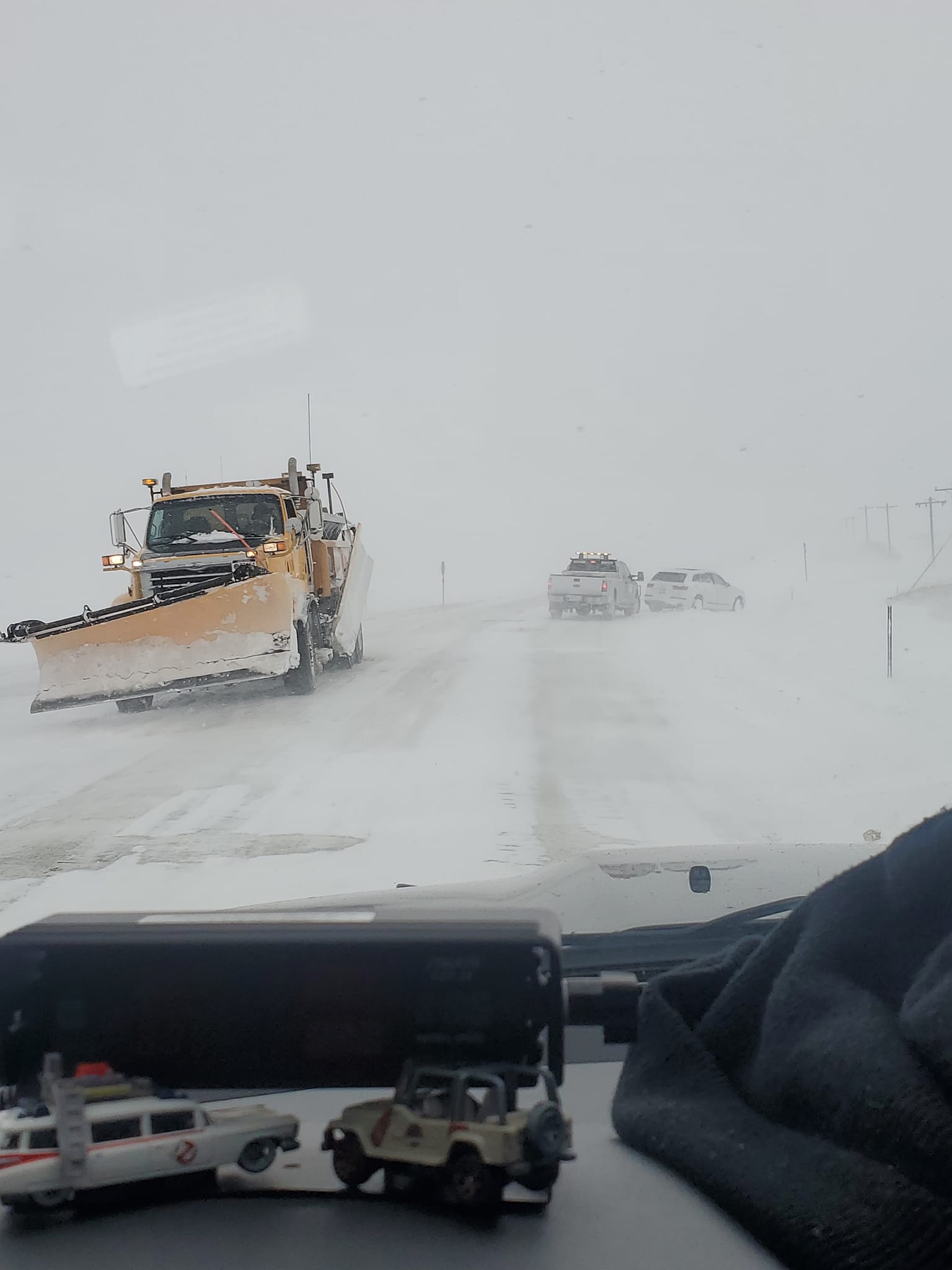 |
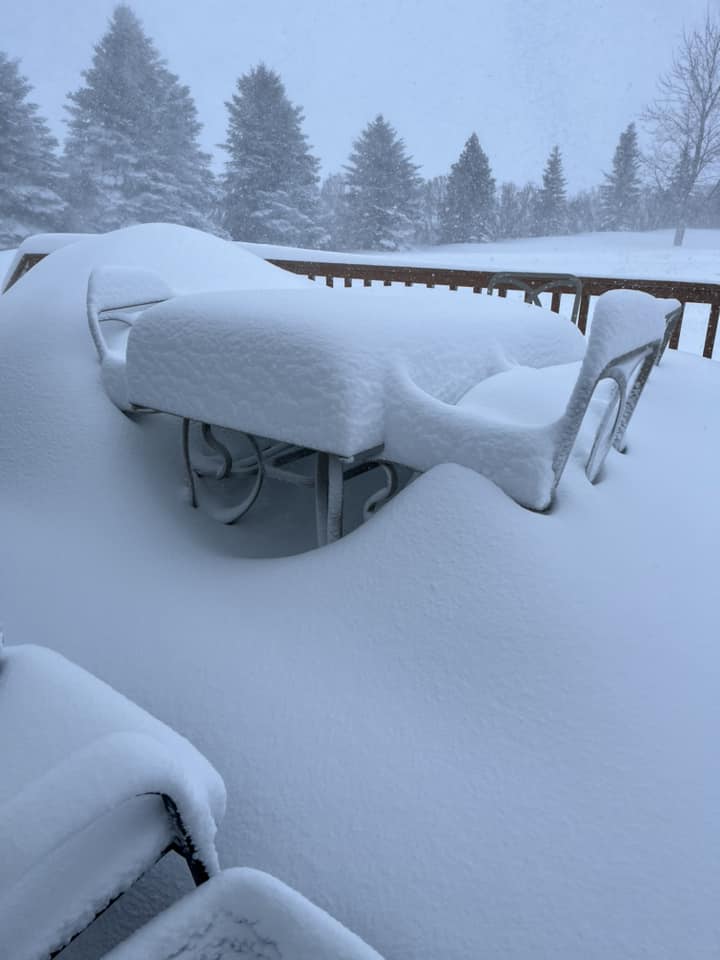 |
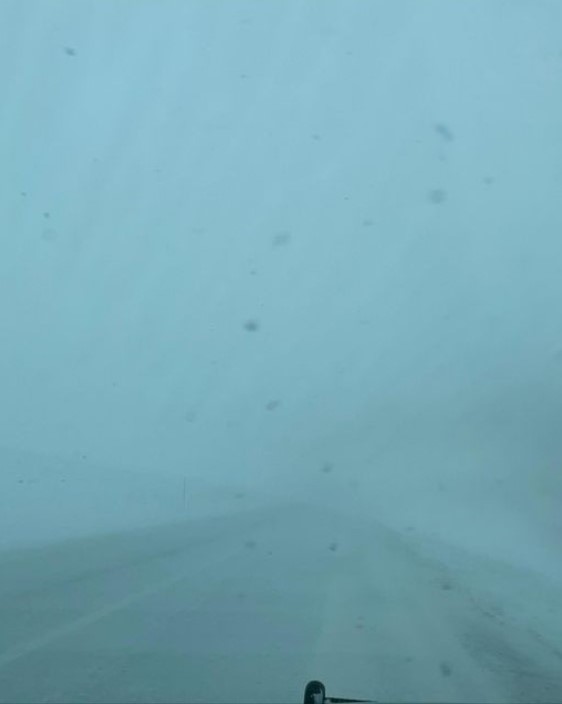 |
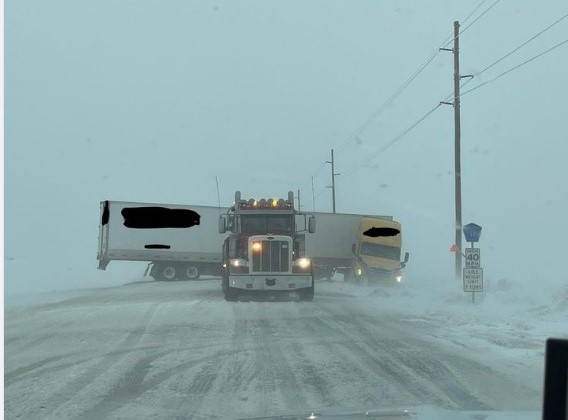 |
| Photo courtesy of the Jones County EM | North Aberdeen, courtesy of Todd Wahl | ~6:30 pm on SD Highway 15 near the Wilmot Rest Area (SD Highway Patrol) | Jackknifed semi on SD Highway 20 near 455th avenue in Codington County (SD Highway Patrol) |
April 4-5th Snow/Ice Reports
2 Day Event Snowfall ending at 7am on April 5, 2023
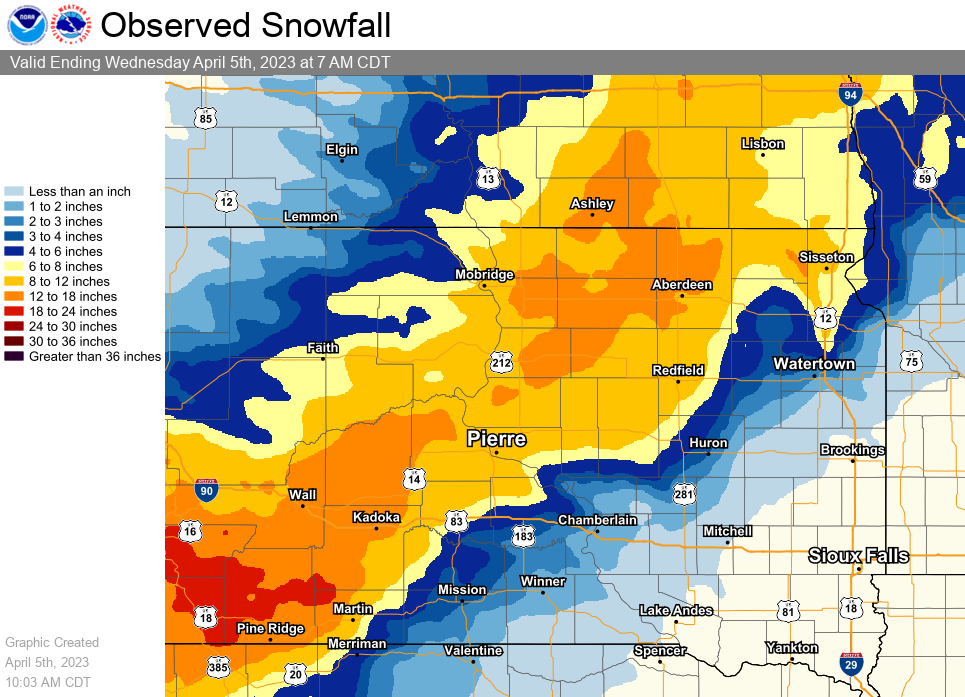
SD Road Conditions as of 10:30 AM on April 5th (Via SD511.org)
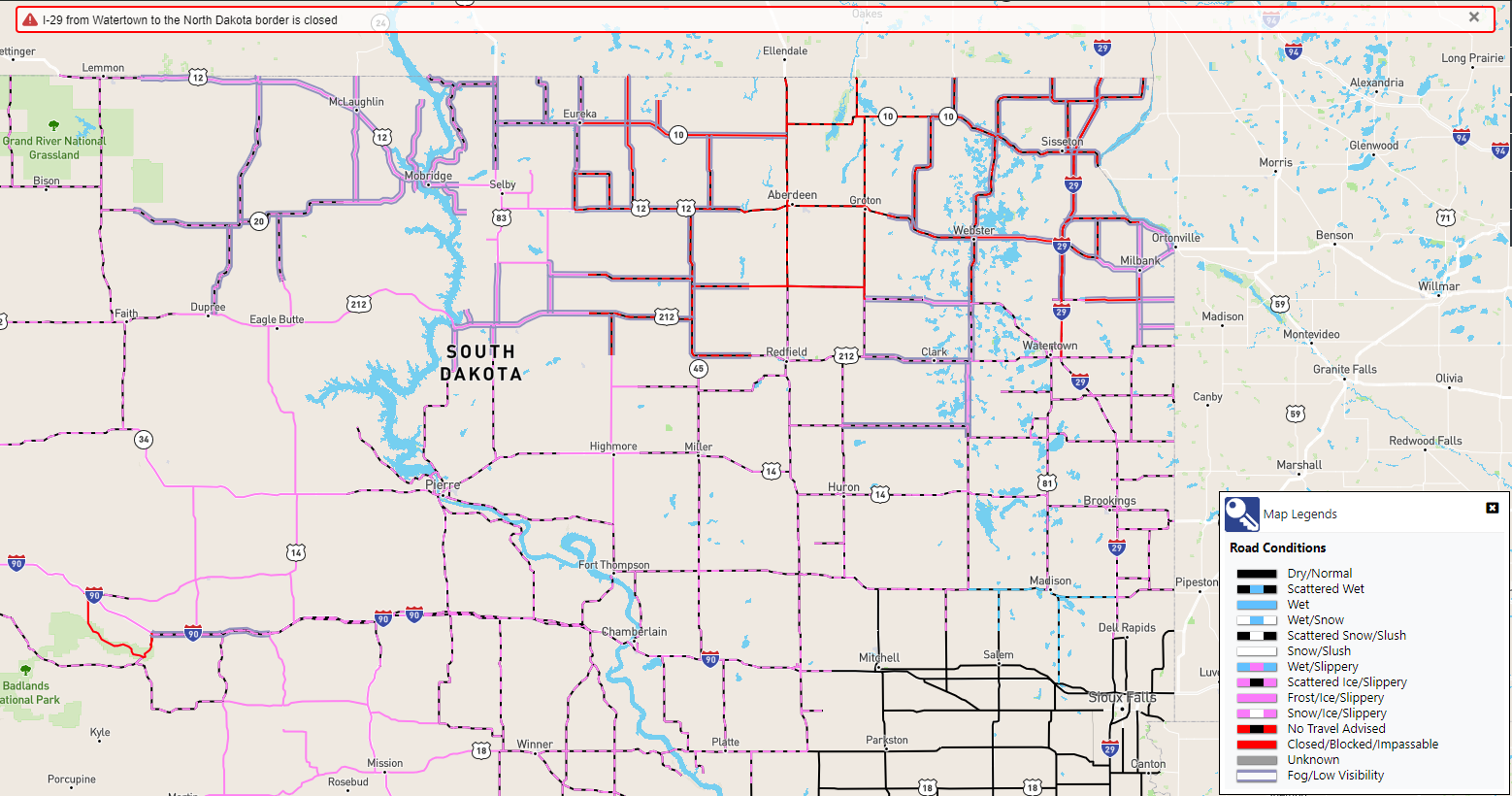
List of snowfall reports
..TIME... ...EVENT... ...CITY LOCATION... ...LAT.LON...
..DATE... ....MAG.... ..COUNTY LOCATION..ST.. ...SOURCE....
..REMARKS..
0600 AM Snow 7 E Hayes 44.37N 100.89W
04/05/2023 M18.0 inch Stanley SD CO-OP Observer
CO-OP Observer station AYES2 Hayes 6 E. 48
hour snowfall. 16 inches fell in the last 24
hours.
0700 AM Snow 8 SSW Seneca 44.94N 99.55W
04/05/2023 M16.0 inch Faulk SD Cocorahs
Cocorahs station SD-FK-8 Seneca 8.3 SSW. 48
hour snowfall.
0800 AM Snow 1 W Roscoe 45.45N 99.35W
04/05/2023 M15.6 inch Edmunds SD CO-OP Observer
CO-OP Observer station ROSS2 Roscoe. 48 hour
snowfall total. 15.1 inches fell in the past
24 hours.
0600 AM Snow 9 E Grey Goose 44.49N 100.17W
04/05/2023 M15.0 inch Hughes SD Cocorahs
Cocorahs station SD-HG-33 Pierre 11.3 NE.
0600 AM Snow 3 NW Westport 45.68N 98.53W
04/05/2023 M14.0 inch Brown SD CO-OP Observer
CO-OP Observer station WPTS2 Westport 2 NW.
48 hour snowfall.
0700 AM Snow 3 NW Westport 45.68N 98.53W
04/05/2023 M14.0 inch Brown SD CO-OP Observer
1.1 inches liquid. 24 hour snowfall.
0700 AM Snow Fort Pierre 44.36N 100.37W
04/05/2023 M12.5 inch Stanley SD Cocorahs
Cocorahs station SD-ST-6 Fort Pierre 0.5 SE.
0.67 inches of liquid water equivalent. 48
hour snowfall. 8.5 inches fell in the last
24 hours.
0700 AM Snow Selby 45.50N 100.03W
04/05/2023 M11.7 inch Walworth SD CO-OP Observer
CO-OP Observer station SBYS2 Selby. 0.88
liquid water equivalent. 24 hour snowfall.
0700 AM Snow 1 NNE Aberdeen 45.48N 98.47W
04/05/2023 M11.1 inch Brown SD Cocorahs
Cocorahs station SD-BR-1 Aberdeen 1.0 NNE.
0.70 inches water equivalent. 48 hour
snowfall. 10.2 inches fell in the last 24
hours.
0800 AM Snow 3 SW Sand Lake Wildlife 45.72N 98.30W
04/05/2023 M11.0 inch Brown SD CO-OP Observer
0.48 inches liquid equivalent. 48 hour
snowfall. 7.0 inches fell in the last 24
hours.
0700 AM Snow 1 SE Pierre 44.35N 100.32W
04/05/2023 M10.0 inch Hughes SD Cocorahs
Cocorahs station SD-HG-10 Pierre 1 S. 0.78
inches of liquid equivalent. 48 hour total
snowfall. 7.5 inches of snow fell in the
last 24 hours.
0800 AM Snow Faulkton 45.03N 99.13W
04/05/2023 M10.0 inch Faulk SD CO-OP Observer
CO-OP Observer station FAUS2 Faulkton 1 NW.
1.0 inches liquid water equivalent. 48 hour
snowfall. 7.0 inches fell in the last 24
hours.
0700 AM Snow 11 SW Eureka 45.66N 99.80W
04/05/2023 M10.0 inch Campbell SD Cocorahs
Cocorahs station SD-CP-9 Eureka 11 WSW. 24
hour snowfall.
0700 AM Snow 2 SSE Claremont 45.64N 98.00W
04/05/2023 M10.0 inch Brown SD Cocorahs
Cocorahs station SD-BR-3 Claremont 2 SSE. 36
hour snowfall, 9.5 inches over the past 24
hours. 0.99 inch liquid equivalent.
0700 AM Snow 4 W Sisseton 45.66N 97.12W
04/05/2023 M9.7 inch Roberts SD CO-OP Observer
CO-OP Observer station SIWS2 Sisseton 3 W.
Liquid equivalent 0.79. 9.2 inches in the
past 24 hours. 48 hour snowfall.
0700 AM Snow 1 SSW Aberdeen 45.45N 98.49W
04/05/2023 M9.5 inch Brown SD Cocorahs
Cocorahs station SD-BR-11 Aberdeen 1 SSW. 24
hour snowfall.
0800 AM Snow 3 WSW Long Lake 45.84N 99.27W
04/05/2023 M9.3 inch McPherson SD Cocorahs
Cocorahs station SD-MP-9 Long Lake 3.1 WSW.
0.77 liquid water equivalent. 48 hour
snowfall. 9.0 inches in the last 24 hours.
0700 AM Snow 8 ENE Sisseton Municipa 45.69N 96.83W
04/05/2023 M9.0 inch Roberts SD Cocorahs
Cocorahs station SD-RB-4 Browns Valley 6 N.
0.81 inches of liquid water equivalent. 24
hour snowfall. A trace of snow fell in the
previous 24 hour period.
0700 AM Snow 4 W Chelsea 45.17N 98.82W
04/05/2023 M9.0 inch Faulk SD Cocorahs
Cocorahs station SD-FK-6 Chelsea 3.8 W. 36
hour snowfall total.
0700 AM Snow 2 SSE Claremont 45.64N 98.00W
04/05/2023 M9.0 inch Brown SD Cocorahs
Cocorahs station SD-BR-3 Claremont 2 SSE. 36
hour snowfall total.
0800 AM Snow 7 WNW Hecla 45.92N 98.29W
04/05/2023 M9.0 inch Brown SD Cocorahs
Cocorahs station SD-BR-4 Hecla 7 WNW.
0700 AM Snow Britton 45.78N 97.75W
04/05/2023 M8.7 inch Marshall SD CO-OP Observer
CO-OP Observer station BRIS2 Britton. 0.58
inch liquid equivalent. 8.3 inch snowfall in
the past 24 hours. 48 hour snowfall.
0800 AM Snow 2 WNW Roy Lake State Pa 45.72N 97.48W
04/05/2023 M8.0 inch Marshall SD CO-OP Observer
CO-OP Observer station ROYS2 Lake City 3 W.
0.74 inches liquid water equivalent. 48 hour
snowfall. 6.0 inches fell in last 24 hours.
1005 AM Snow 2 N Eagle Butte 45.02N 101.24W
04/05/2023 M8.0 inch Dewey SD Cocorahs
Cocorahs station SD-DW-5 North Eagle Butte
1.7 NNW.
0900 AM Snow Murdo 43.88N 100.72W
04/05/2023 M7.6 inch Jones SD CO-OP Observer
CO-OP Observer station MURS2 Murdo. 0.47
inches of liquid water equivalent. 48 hour
snowfall total. 4.1 inches of snow in the
last 24 hours.
0700 AM Snow Turton 45.05N 98.10W
04/05/2023 M7.0 inch Spink SD CO-OP Observer
CO-OP Observer station TURS2 Turton. 0.29
liquid equivalent. 48 hour storm total
snowfall. 6 inches in the past 24 hours.
0800 AM Snow 2 S Doland 44.87N 98.10W
04/05/2023 M6.6 inch Spink SD CO-OP Observer
CO-OP Observer station DOLS2 Doland 2 S.
0.50 inches of liquid water equivalent. 48
hour snowfall totals. 4.1 inches fell in the
last 24 hours.
0800 AM Snow Groton 45.45N 98.10W
04/05/2023 M6.0 inch Brown SD Public
Storm total snow through 8 AM.
0800 AM Snow 1 NNW Eureka 45.78N 99.63W
04/05/2023 M5.8 inch McPherson SD CO-OP Observer
CO-OP Observer station ERKS2 Eureka. 0.51
inches liquid water equivalent. 48 hour
snowfall. 5.4 inches in the last 24 hours.
0700 AM Snow 8 N Vivian 44.04N 100.27W
04/05/2023 M5.5 inch Lyman SD Cocorahs
Cocorahs station SD-LY-5 Vivian 7 NNE. 060
liquid water equivalent. 48 hour snowfall
total. 4 inches fell in the last 24 hours.
1200 PM Snow Andover 45.41N 97.91W
04/05/2023 M5.5 inch Day SD CO-OP Observer
CO-OP Observer station ANVS2 Andover. 0.55
inches liquid equivalent. 48 hour snowfall.
1.5 inches fell in the last 24 hours.
0800 AM Snow 5 N Firesteel 45.49N 101.29W
04/05/2023 M5.0 inch Corson SD Cocorahs
Cocorahs station SD-CR-18 Isabel 9.5 NE.
0.65 liquid water equivalent. 24 hour
snowfall.
0600 AM Snow 2 N Browns Valley 45.62N 96.83W
04/05/2023 M4.6 inch Traverse MN CO-OP Observer
CO-OP Observer station BRVM5 Browns Valley.
24 hour snowfall. 0.45 inches of liquid.
0730 AM Snow Milbank 45.22N 96.63W
04/05/2023 M4.5 inch Grant SD CO-OP Observer
CO-OP Observer station MLBS2 Milbank. Liquid
equivalent 0.45. 3.0 inches of snow over the
past 24 hours. 48 hour snowfall.
0700 AM Snow 2 SE Roslyn 45.47N 97.47W
04/05/2023 M4.4 inch Day SD Cocorahs
Cocorahs station SD-DY-17 Roslyn 2 SE.
0800 AM Snow Mclaughlin 45.81N 100.81W
04/05/2023 M3.2 inch Corson SD CO-OP Observer
0.16 liquid water equivalent. 48 hour
snowfall total. 2.0 inches fell in the last
24 hours.
0600 AM Snow Clark 44.88N 97.74W
04/05/2023 M3.0 inch Clark SD CO-OP Observer
CO-OP Observer station CAKS2 Clark. 0.32
inch water equivalent. 1.3 inches of snow in
the past 24 hours. 24 hour snowfall.
0809 AM Snow 4 ENE Reliance 43.91N 99.53W
04/05/2023 M2.4 inch Lyman SD Cocorahs
Cocorahs station SD-LY-26 Reliance 4 ENE.
0725 AM Snow 3 NNE Gann Valley 44.08N 98.97W
04/05/2023 M2.2 inch Buffalo SD CO-OP Observer
CO-OP Observer station GNVS2 Gann Valley 3
NNE. 0.17 inches liquid water equivalent. 24
hour snowfall.
0800 AM Snow 1 WSW Webster 45.33N 97.53W
04/05/2023 M2.0 inch Day SD CO-OP Observer
CO-OP Observer station WBRS2 Webster. 0.55
liquid equivalent. 48 hour snowfall. 1.1
inches fell in the past 24 hours.
0700 AM Snow La Bolt 45.05N 96.68W
04/05/2023 M1.5 inch Grant SD Cocorahs
Cocorahs station SD-GT-9 LaBolt. 0.51 inches
liquid equivalent. 24 hour snowfall.
0600 AM Snow Watertown 44.91N 97.12W
04/05/2023 M1.5 inch Codington SD CO-OP Observer
CO-OP Observer station WATS2 Watertown.
April 4-5th Photos
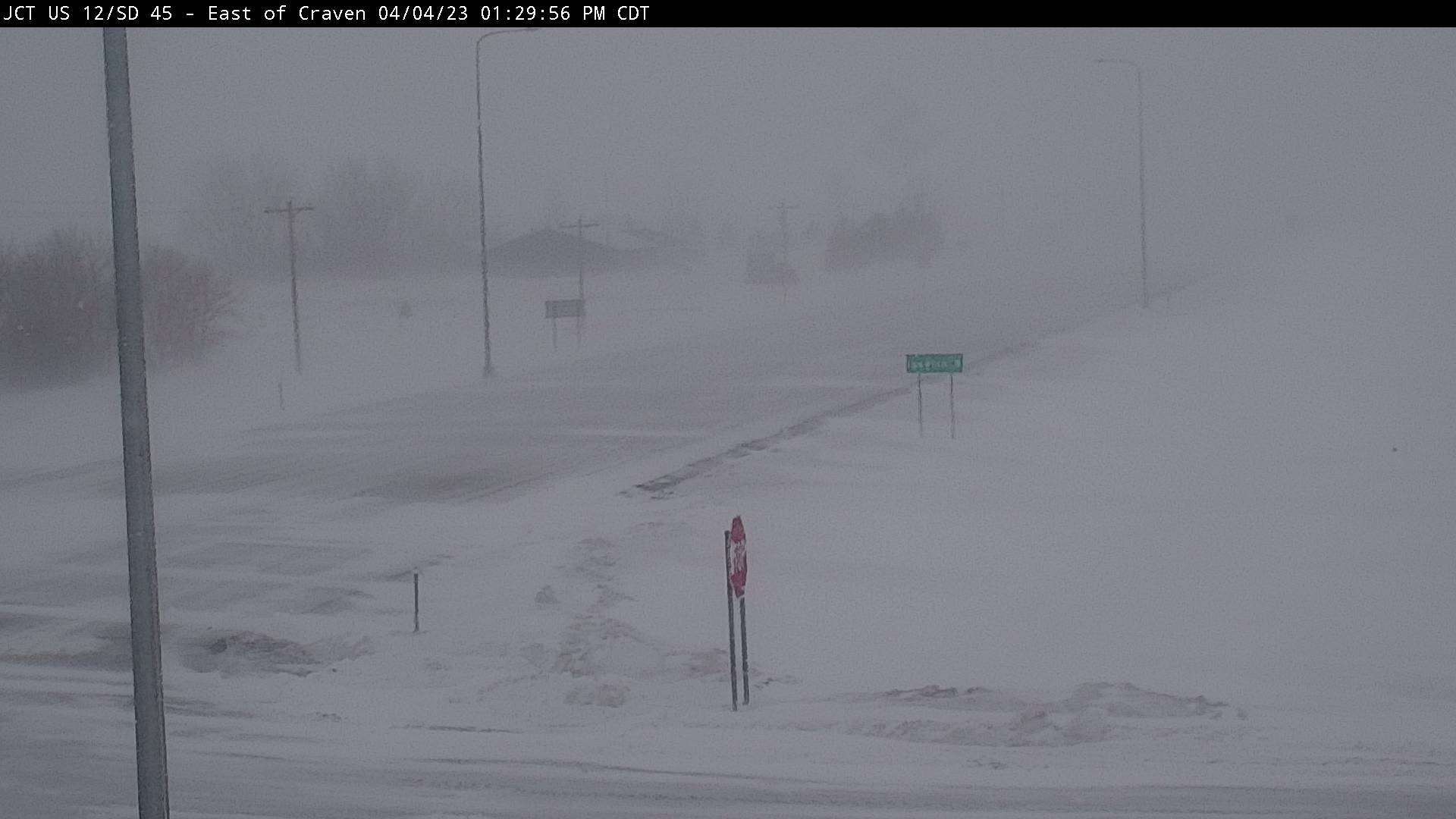 |
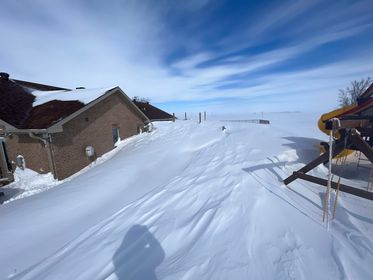 |
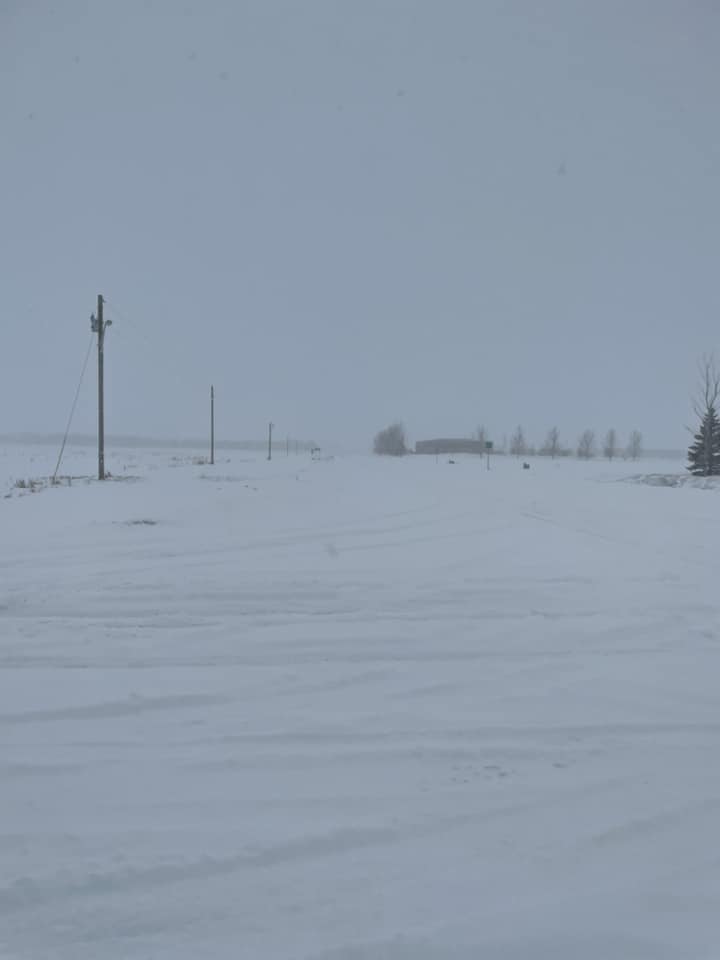 |
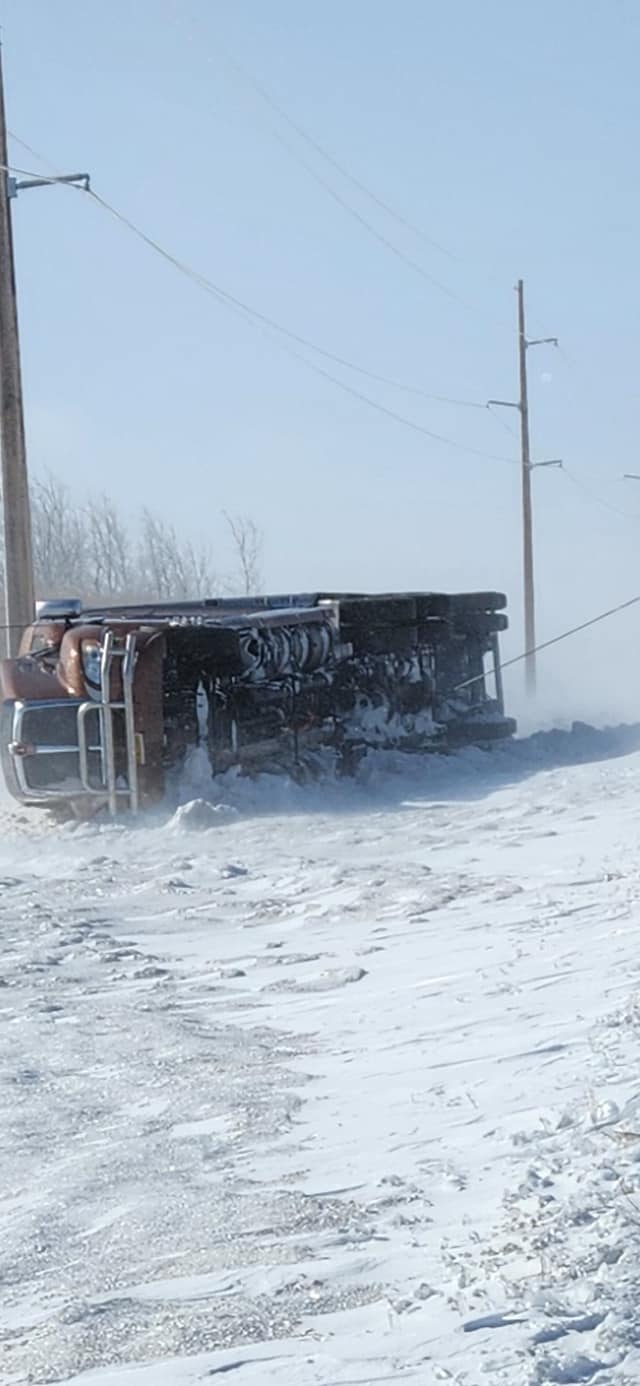 |
| View of US12 from Craven's Corner, near Ipswich, SD at 1:30 PM on April 4th. Visibility from falling snow was less than 1/2 mile. (Image from SD DOT) | Large drift next to a house 2 miles east of Barnard, SD (Brittany Foley) | Photo Courtesy of the Brown County Sheriff, taken at 10am on April 4th | Photo courtesy of the Grant County EM, taken around 2pm on April 5th |
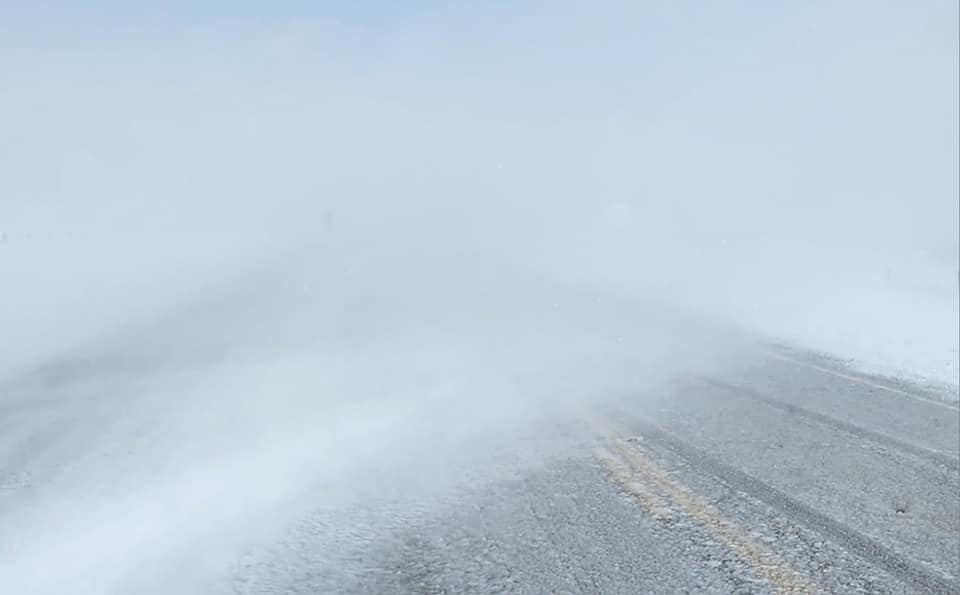 |
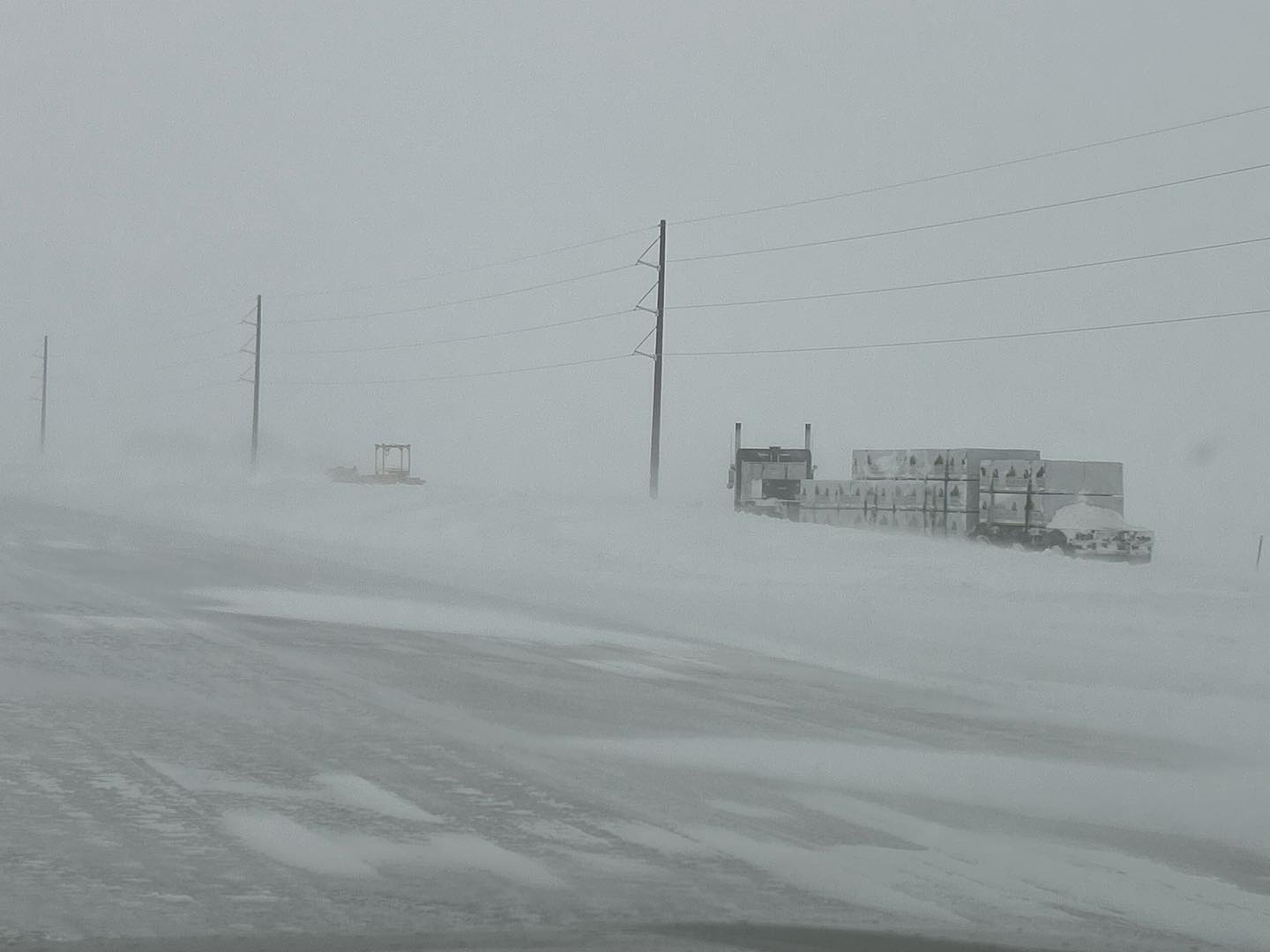 |
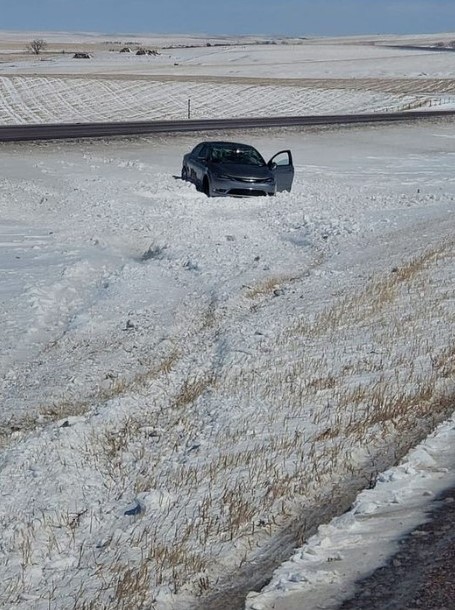 |
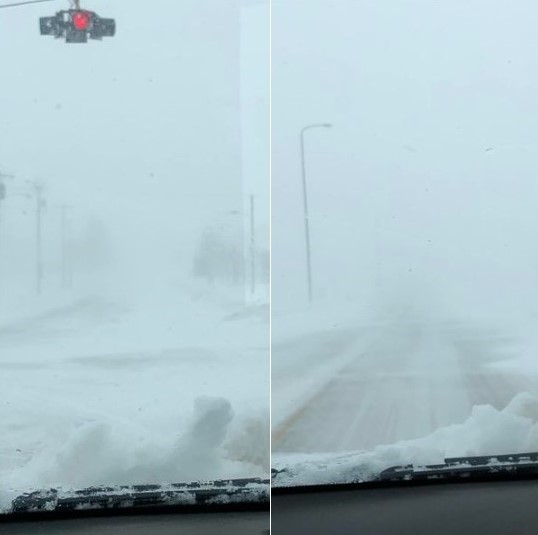 |
| Photo courtesy of the Grant County EM, taken around 2pm on April 5th | SD Highway 12 near Summit, at 5:55pm on April 4th (SD Highway Patrol) | Near Vivian during the afternoon of April 5th (Jones County EM) | April 4th in Murdo (Jones County EM) |
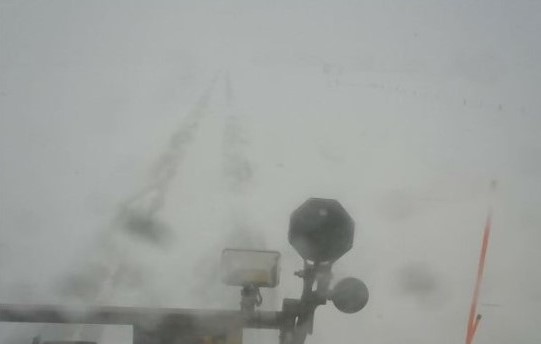 |
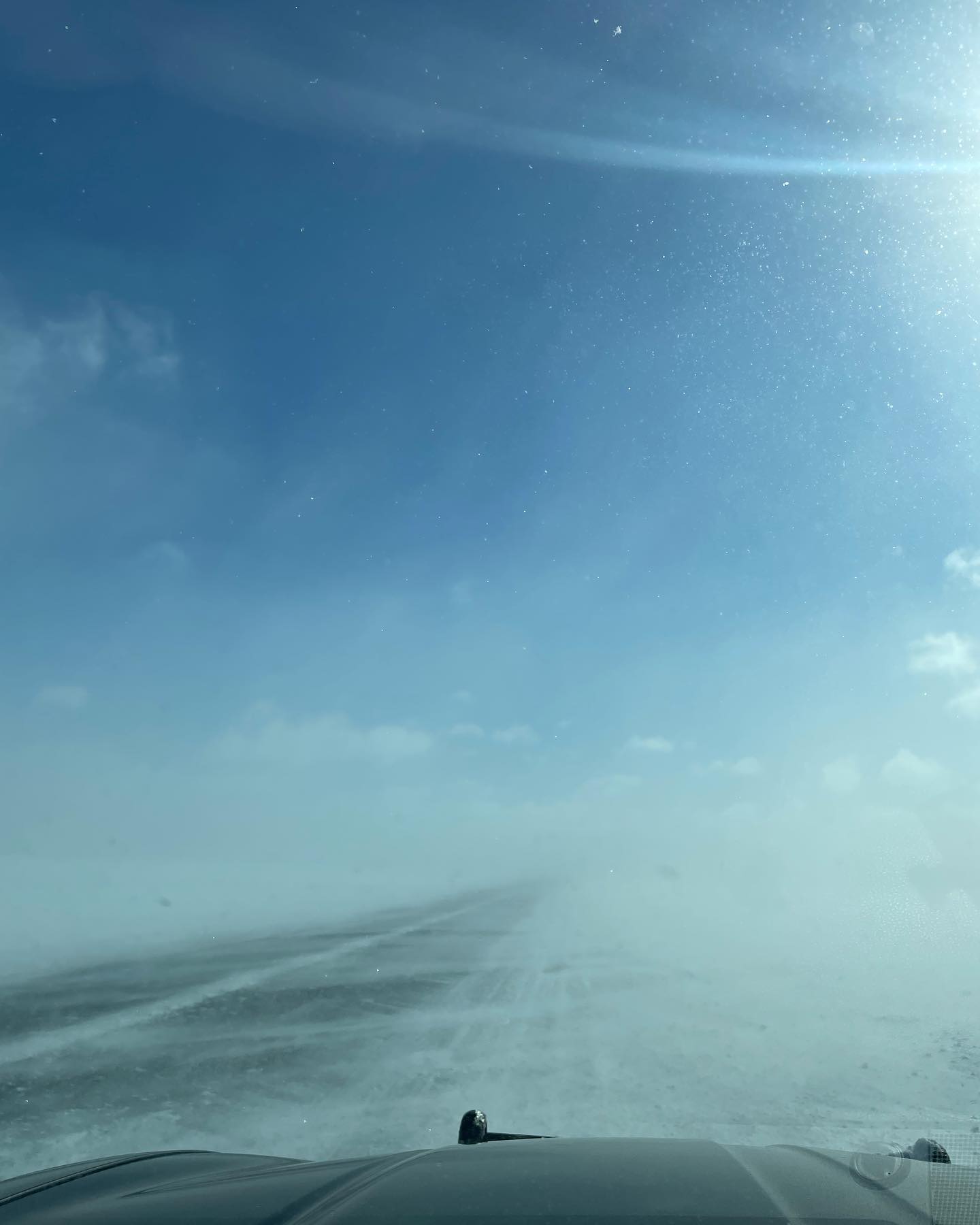 |
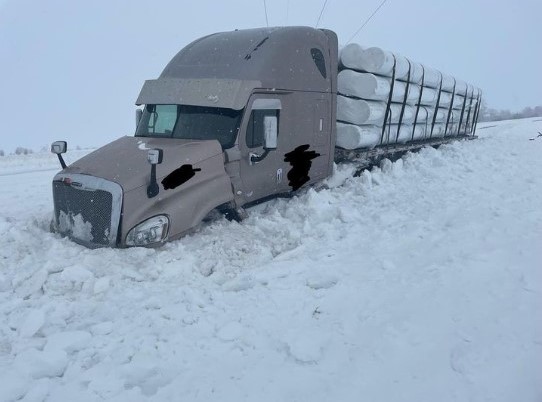 |
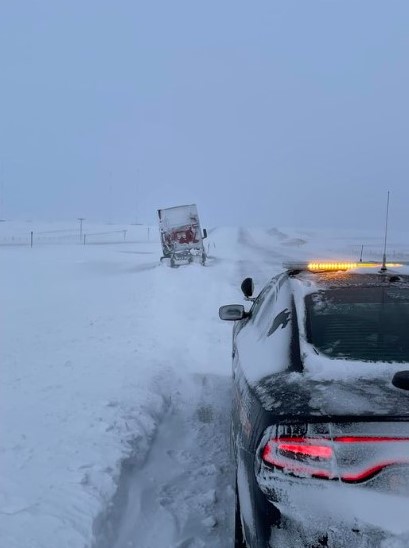 |
| The scene from a SDDOT plow near Sisseton around 1:15pm on April 4th | Reduced visibility from blowing snow on SD Highway 15 near Wilmot on April 5th (SD Highway Patrol) | I-29 near the New Effington exit around 11am on April 4th (SD Highway Patrol) | US Highway 83 near Selby at 10am on April 5th (SD Highway Patrol) |
 |
Media use of NWS Web News Stories is encouraged! Please acknowledge the NWS as the source of any news information accessed from this site. |
 |